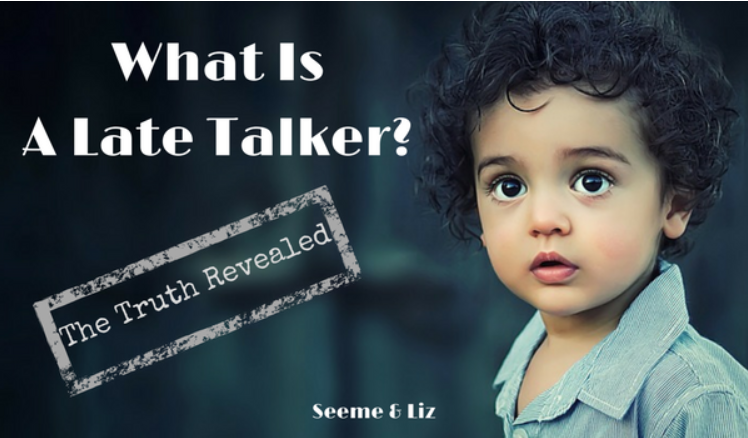While practicing as a speech–language pathologist I often heard parents say “oh, my child’s just a late talker, according to our Doctor”.
But what is a late talker exactly and is there reason to worry?
Let me explain.
A Late Talker Is:
- A child typically between 18 and 30 months
- A child who understands many words and is able to follow simple directions
- A child who engages in play and demonstrates age appropriate social skills
- A child who does not have any developmental or physical delays such as Autism, Down Syndrome, Cerebral Palsy, etc.
- A child who simply isn’t using any, or as many words as would be expected for Their age. This is considered an expressive language delay.
Late talking children often tend to be boys (although girls can be late talkers as well).
Babies born prematurely or those with a low birth weight are at a higher risk for being late talkers.
In many cases, it is common to find that there is a family history of late talking or speech–language delays.
How Many Words Should A Toddler Be Using?
By 18 months children should be using about 20+ words consisting of:
Nouns: Shoe, ball, mommy etc.
Action Words: Eat, drink, sleep, etc.
Descriptive Words: Big, little, cold, hot, etc.
Preposition: In, on, up, etc.
However, don’t be alarmed if your 18 month old is only using nouns and action words.
In the next 6 months they will continue to learn to say more words including descriptive words and prepositions.
You will also see pronouns emerging (e.g. my, mine, you, she, he).
Word combinations usually can be heard between 18 and 24 months.
Children typically need 50+ words made up of nouns, verbs, adjectives, prepositions and pronouns before they will start to spontaneously combine words to make simple 2 word phrases (e.g eat cookie).
If your child isn’t using many words, download my FREE checklist “The 85 Most Common First Words”.
Use this list to check off words your child is already using and refer to it to come up with ideas for simple words he may start saying soon if he hears the word enough.
Between 24 and 30 months a child should be using approximately 50–100 words.
Novel two to three word combinations such as “drink juice”, “mommy big shoe”, “light on”, etc. are being used more regularly to communicate.
In order for a phrase to be considered novel, it must not be a memorized phrase such as “good night” or word repetitions like “bye, bye”.
For more information on what a child should be doing at a certain age, head over to ages and stages of language development.
If, based on this information your child falls into the “late talker” category and you are not working with a Speech–Language Pathologist, be sure to get the book “It Takes Two To Talk” by Speech–Language Pathologist of the Hanen Centre, Elaine Weitzman.
This book is packed with information and strategies that you can implement at home right away!
I always recommended this book to parents of young children with mild to moderate speech and language delays!
Don’t let the price tag discourage you. It is well worth every penny!
Late Talkers Will Catch Up – But Not Always
I have seen several articles in the media leading readers to believe that it’s OK to take a “wait and see” approach and that pretty much all late talkers end up being just fine.
Here is an example of one of these articles: Late Talkers Do Fine As They Grow Up.
However, this study and others like it, mainly look at behavioral and emotional outcomes.
It’s a given that a late talking child may develop some behavioral and emotional issues.
They are frustrated that they cannot communicate to have their needs met.
Thus, they may resort to hitting, biting, crying, screaming etc.
Once they start talking, these behaviors usually subside.
What these studies fail to look at are the language outcomes.
Therefore, based on these studies alone, there is no way of saying that late talkers will be fine with regards to language development.
An observation I made while working as a speech pathologist was that several children who I was seeing for speech delays (not producing sounds properly) were often described as late talkers by their parents during our initial assessment session.
While I was working with them, their language skills were not the issue because they had “caught up”.
But because they didn’t really speak until they were older than 24 months, they didn’t have the practice producing many of the sounds their peers did.
So even though they didn’t have lasting language delays, they had speech production delays.
Studies, such as this one by Ellis EM and Thal DJ. (2008) found that about 70–80% of children who were late talkers (purely an expressive language delay) did catch up to their peers with regards to language development, without any form of language therapy.
But where does that leave the other 20–30%?
Sharma M., Purdy, S.C. and Kelly, A.S. (2009) found that the children whose language skills did not catch up and did not receive language therapy continued to struggle with expressive language as well as reading and writing once they entered school.
There is another group of children who do seem to catch up in language skills without any intervention.
When these children enter school they are speaking in sentences and are able to communicate and socialize with their peers.
In spite of that, Rice, M. L., Taylor, C. L., and Zubrick, S.R. (2008) found that these children often fall behind their peers in some aspects of language development such as grammar and language complexity.
They may also have smaller vocabularies as compared to their peers.
This is the group of children that concerns speech–language pathologists the most.
These children will continue to struggle as they get older, but the struggles will be considered minor.
They typically will not qualify for any type of language intervention once they enter school because the delay is not considered severe enough to warrant intervention.
Yet, as the child gets older it will become more apparent that they aren’t quite at the same level as their peers.
Early language intervention occurs during a critical time in a child’s development, which is between the ages of 0 and 3 years.
Children can learn so many skills during this time in their lives that will set the foundation for skills they haven’t even acquired yet.
If your child is a late talker, my opinion is to always have them assessed by a licensed Speech–Language Pathologist.
The speech pathologist may advise a “wait and see” approach based on their evaluation or they might suggest a few therapy sessions or perhaps a home program where the parents follow a plan set out by the therapist and check in every few weeks/months to see if goals are being met.
Red Flags Indicating That A Late Talker Requires Therapy
As I mentioned above, about 20–30% of children do not completely outgrow their expressive language delay and will have ongoing difficulties once they enter school.
It is impossible to predict which children will fall into this 20–30%.
But there are some red flags that you can be on the lookout for.
If your child (18–30 months) has any of these in addition to not using as many words as expected, please have your child seen for a speech and language evaluation. The sooner the better!
- history of repeated ear infections
- quiet as a baby
- doesn’t respond to name when called
- limited use of gestures to communicate (gesture use is a precursor to spoken language)
- limited number of sounds produced when attempting to “talk”
- difficulty with pretend play
- limited social interactions with peers
- family history of language and/or learning delays
- unable to follow age appropriate directions or sometimes having difficulty understanding what is being said to him/her
- words that are used tend to only be nouns and verbs. Prepositions, pronouns and adjectives are never or rarely used.
In order to combine words into phrases and sentences, a child’s vocabulary must be made up of more than just nouns and verbs.
Summary
To reiterate, studies are showing that “late talkers” do not always catch up with regards to language development when intervention is not sought out.
Approximately 20–30% of children do not catch up to their peers, even when the delay is purely an expressive language delay – meaning they do not have any of the red flags mentioned above.
I know that Einstein didn’t talk until he was 5 (or something like that) and he turned out to be a genius.
Of course this is possible as we know that 70–80% of children who are late talkers turn out to be just fine, or even gifted, without any type of intervention.
But, since we cannot really predict which children will fall into the group that will have struggles once they enter school, isn’t it better to be safe than sorry and have your child seen by a speech–language pathologist?
If nothing else but to ease your mind and know that you have done what you can to help your child!
I hope that this has answered the question “what is a late talker?”
If you still have any questions or have any thoughts on this topic you would like to share, please post a comment below.




